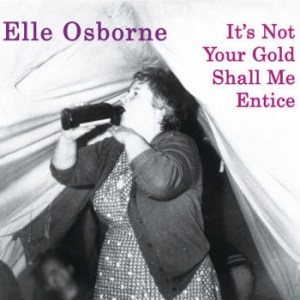 Although this is her third album, until now my only aural encounter with the Sussex-based folkie was her collaboration with James Yorkston, playing fiddle on a very brief a capella ‘My Doffing Mistress’ on the 2012 Daily Worker benefit album We’re All In It Together. However, my extended introduction fortuitously coincides with a new stage in her career. Working with such luminaries as Yorkston, Alasdair Roberts and, from Trembling Bells, Mike Hastings and Alex Neilson, the latter of whom has likened her voice to a cross between Lal Waterson and Nico, the album marks the first time she’s recorded her own rather than traditional material. Indeed, not only did she write it, she arranged and produced it too.
Although this is her third album, until now my only aural encounter with the Sussex-based folkie was her collaboration with James Yorkston, playing fiddle on a very brief a capella ‘My Doffing Mistress’ on the 2012 Daily Worker benefit album We’re All In It Together. However, my extended introduction fortuitously coincides with a new stage in her career. Working with such luminaries as Yorkston, Alasdair Roberts and, from Trembling Bells, Mike Hastings and Alex Neilson, the latter of whom has likened her voice to a cross between Lal Waterson and Nico, the album marks the first time she’s recorded her own rather than traditional material. Indeed, not only did she write it, she arranged and produced it too.
There is one traditional number here, a spare, plucked fiddle version of ‘Come Write Me Down’, taken from the Copper family songbook and from whence comes the album’s title. However, if you weren’t already aware, there’s several tracks that (were it not for some of the lyrics) you could be persuaded had been knocking round the folk archives for a century or so, particularly the fiddle-led relationships-themed ‘And Everything’, that almost imperceptibly gathers pace as it proceeds and the band join in, and the a capella ‘The Hired Hand’ (where she harmonises with herself under the name Dusty Springsteen).
Raised on the North Sea coast of Lincolnshire (which explains the accent), she’s perhaps inevitably drawn to songs of ships and the sea. Bearing a lilting melody reminiscent of Dylan’s ‘To Ramona’, featuring sax and melodeon, ‘This Ship Is On A List’ wittily uses a disintegrating ship as a metaphor for a collapsing relationship, launching into a full on trad-sounding shanty mid-way (though perhaps the line “Now the focsle is fucked”, isn’t perhaps one Fisherman’s Friends might include). Featuring Hastings on Jews harp, ‘Salt’, one of the albums many standout numbers, addresses the dangerous allure of fishing fleets, delivering a chorus of “In like a lion out like a lamb. Set sail a boy, came home a man” that fires up thoughts of classic Richard and Linda Thompson.
Again Jews harp and featuring Dan Quinn on melodeon, the same is true of ‘Toast (The Ballad Of Michael ‘Mini’ Cooper)’, a luminous fiddle waltzing number that tells the story of the titular 1970s child arsonist, a bright but troubled young 10-year-old from Co. Durham who set fire to his parents house, allegedly knowing his abusive father was asleep upstairs. The subject of two BBC documentaries, in 1974 (directed by Franc Roddam) and a decade later, after spending most of those years in psychiatric care at a series of high security special schools, he was sentenced to life in 1990 after setting fire to a bottling plant, Osborne cuts to the heart of his morally ambiguous story (the full details of which, including Cooper’s shattered dreams of a film and being a playwright, make powerful reading), seeing him as a victim as she sings “when you’re silenced with violence and you’re given no chance and no choice. And when you’re brilliant and bored and you’re beaten, fire is your vengeance and voice.” If this isn’t among next year’s Radio 2 Folk Awards Song of the Year nominees, then there’s no justice.
The album comes to a close with the traditional lyric styled ‘Undone’ (“Cut off my long yellow hair, dress in mans’ array, make myself unbeautiful, no more will I stay”), set to a backing of fiddle drone and Neilson’s unconventional percussion and drums with Osborne humming the playout coda, and, finally, ‘All One’, featuring just her and Hastings’ plangent acoustic guitar, which, her delivery of the ‘One small space and a letter between all one and alone’ refrain, putting me in mind of Sandy Denny.
However, perhaps because of the time of year and the fact that the cascading tubular bells recall Jethro Tull’s festive ‘Ring Out, Solstice Bells’, I have to say that my personal favourite is the album opener, ‘I Don’t Like Sundays’, a song that sets the theme of survivors and survival with the protagonist encouraging a friend to fight against their depression ( “I saw the cloud come like a shroud, stealing all your joy”) and reminding that “Sometimes all you can do is put one foot before the other and heed the conversation tween the future and the past.”
The album cover is a 1960’s picture of Osborne’s grandmother, Katharine Compton, in a Sidmouth Festival drinking competition. Having given The Watersons and Peter Bellamy their first club gigs, Compton is something of a legend in folk circles; with this album her granddaughter should become one too.
Mike Davies
Artist’s website: https://www.facebook.com/elleosbornemusic/
‘Come Write Me Down’ – official video:
 Thanks for stopping by. Please help us continue and support us by tipping/donating to folking.com via
Thanks for stopping by. Please help us continue and support us by tipping/donating to folking.com via
You must be logged in to post a comment.